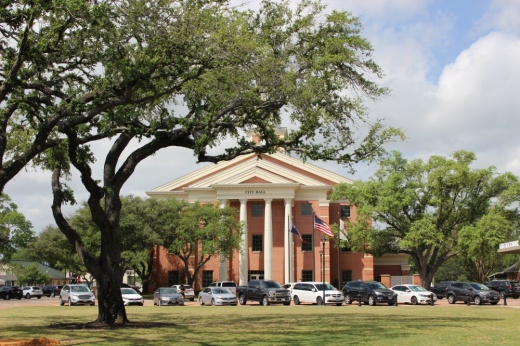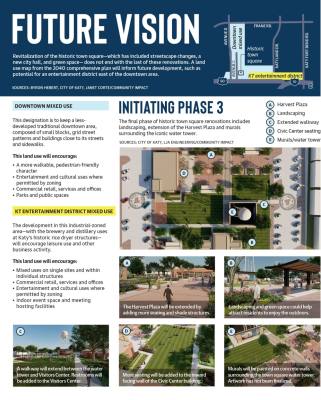Business owners and residents have awaited this project’s conclusion, including Betsy Proctor—who co-owns The Limited Edition Art & Antiques shop along Second Street. Proctor was on a committee created by the Texas Downtown Association in 2012 to discuss the project.
“There was [going to be] an amphitheater where they could have music and concerts, but for whatever reason—funding, the pandemic, [Hurricane] Harvey—those plans were changed,” Proctor said. “So the plans have been modified to be a little bit more sensible.”
The entire project included improved traffic flow, infrastructure changes, a new city hall, repurposed administrative buildings, and green space to encourage foot traffic around the town square, located between Avenues B and C.
City Administrator Byron Hebert said this was the original intention of the area, per a 1907 map from which the revitalization of the town square is based. The total project cost will hit $7.67 million by its conclusion in mid-October, before the Katy Rice Festival, Hebert said. Phase 3, the project’s last, has a $3.78 million price tag for its construction and design, with money coming from 2016 Civic Center bonds, hotel occupancy tax funds and general fund reserves.
The work to renovate the town square has been delayed several times due to the 2016 Tax Day floods, Hurricane Harvey in 2017, and COVID-19 in 2020, per previous reporting by Community Impact.
“This has been a long project coming,” Hebert said at a March 8 special meeting to approve bids for the final renovations. “The reason why we’re here today is to make sure that our time is kept.”
Phase 3 includes landscaping, increased seating capacity and shading, a removable stage for events, and murals around the water tower, per renderings from firm LJA engineering.
In the 11 years since the project began, Hebert said the goal remains to serve businesses around the town square, attracting residents in a commonplace, and encouraging visitors to stay and enjoy Katy’s heritage.
Business owners near the square and along Hwy. 90—where the Katy rice silos are being converted to a beer garden, heritage museum and food truck destination called The Dryer—anticipate these changes will make the city a destination for travelers.
“Connecting the [town square] to The Dryer would create such a unique opportunity for the city of Katy to really blossom and to be recognized as a tourism place,” said Hadi “Andrew” Nurcahya, developer of The Dryer.
A new look
The renovations began in 2015 with a $3.67 million integrated streetscape design—which called for massive thoroughfare changes, Hebert said.
The asphalt roadways around the town square were replaced with concrete pavement, curbs and gutter drainage facilities, he said. The street redesign incorporated on-street parking options, sidewalks and lighting.
Subsequently, the city converted the municipal, administrative building with water tanks into the Civic Center—which has the capacity of over 100 people. Under the same 2018 contract, the city’s parks and recreation department annex became a Visitors Center for tourists. These buildings were completed in October 2019.
After being stalled by the uncertainty of the pandemic, Hebert said there was a push for more outdoor activities—which prompted the city to add almost $210,000 of green space and landscaping to the square.
“COVID-19 ... [also] showed us that we did not need to have a permanent stage and amphitheater as originally planned—as it would limit the flexibility of the square,” Hebert said.
The historic town square is within the 15-block radius zoned by the city as the Old Katy District, Ward A Council Member Janet Corte said. Its zoning designation means any new structures have architectural detailing regulations, masonry and wood requirements, height limitations, and color schemes that are in-line with the historical theme of the area.
“City Planning and Zoning, a few years ago, went in and tightened up the building standards for this area to try and keep the historical value,” Corte said.
Further visions for the town square include a trolley stop, where residents and visitors can ride to and from Katy Mills and the Boardwalk District, once completed, Corte said. Business owners have advocated for public restrooms, which will attach to the Visitors Center. Bids to construct these were awarded at a March 27 City Council meeting. The $303,858 project is separate from, but aligned with, the renovation project.
Business benefits
Bill Fanning opened the Katy Crossing Icehouse bar in February. He bought the building at the corner of Avenue C and Second Street in 2016, amid ongoing renovations to the area.
“Over the last three years, I have really seen an effort from the city to bring [the square] alive [and] to bring in more businesses,” Fanning said.
Before Katy Crossing Icehouse and Southern Dough Baking Co.—a bakery and restaurant that opened April 21—there was nothing keeping consumers in the area for long periods of time, Fanning said.
“We are turning this little by little into a destination area,” Fanning said.
Proctor, whose business opened in 1993, said the changes to downtown will benefit her business, but she hopes they will be completed quickly.
“If [a trolley] brought people in from the motels and hotels and the mall, that would add business,” Proctor said. “The restroom will keep people in town longer. ... If they finish the park, that will also help the market.”
Future land use
One piece of the city’s 2040 comprehensive plan, which was adopted March 27, is a future land use map of the city. The map provides a framework for developers, Corte said, but it doesn’t impact zoning ordinances.
Per the future land use map, the town square is in the downtown mixed-use area. To the west of that—north of Hwy. 90 and anchored by Katy’s rice dryer structures—is the suggested KT entertainment district mixed-use area.
Although the land is zoned for industrial use, the businesses that reside there—including The Dryer, No Label Brewing Co. and the MKT Distillery—already serve an entertainment purpose, said Corte. Officials see this area’s potential for cultural land uses where permitted by zoning, such as restaurants, pubs, live music venues, theater, art galleries and museums.
“I think [the city] is starting to realize pedestrian traffic and this more city lifestyle-type of gathering [place] is getting to be very popular,” Nurcahya said.
Editor's Note: The Civic Center is not available for public use, per updated information from the City Administrator's office.






